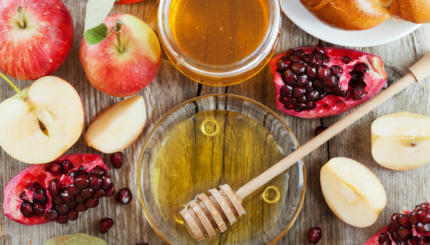Yesterday at Or Shalom Synagogue in Vancouver, British Columbia, Canada, we harvested horseradish from our synagogue garden. We are an urban synagogue, with only a few garden beds on our property. Still, we pulled from the earth enough horseradish for about twenty Passover Seder gatherings.
Our spring harvest was part of an afternoon gathering we called the “Interfaith Garden Cafe.” A group of fifteen Jews and Christians gathered to explore the spirituality of gardening. Together we set our intention, offering ideas from our shared Biblical creation story. Humanity was placed in a lush garden, filled with every kind of tree. Humans were encouraged to eat — and also instructed to care for the garden. The message? The earth’s produce will support you, as long as you support it.
Of course, once we put our shovels to the bed, the horseradish was ambivalent about supporting us. The roots demonstrated admirable principles of tenacity and community. Roots from several mini-colonies of radish had grown together. To remove even one, we had to remove all.
Inspired by these roots, we talked about how gardening can bring people together. One American person’s strawberry patch fed an entire neighbourhood, including possums, cats, and children from the daycare across the street. One Canadian person’s quest to clear space for a small urban garden brought forty apartment-dwelling strangers together. One African person’s childhood included groups singing and gardening together, many hands turning work into play.
We also talked about the spirituality of growing food. Encountering insects and plants in the garden makes us appreciate the diversity of life forms, and wonder what their consciousness might be like. If each reflects a facet of the Divine mind, that mind must be amazing indeed.
For human beings, food is a major life theme, present to our awareness every day. Food makes possible a life of the body; it invigorates heart, mind, and spirit; its particular qualities change our consciousness. For example: during the Passover Seder, as we speak of slavery, one bite of horseradish (maror) can make us shudder at its bitterness and bring tears to our eyes.
After the farmer plants, and while the farmer tends, the farmer also waits for forces beyond her control to do their work. Growing food is a tremendous leap of faith. Before we parted, we acknowledged that leap with two Hebrew prayers. One celebrated our active planting:
Shehecheyanu
(thank you God for bringing us to this time). The second celebrated our hopeful waiting: Birkat Hashanim (thank you God, who brings the dew and rain that make a good harvest possible).
Here in Vancouver, our Judaism is influenced by local culture. Our city is built between mountains and lowlands, surrounded by rivers and seas, a short hop from forests, fjords, and cliffs. Despite a century of oppression, Indigenous culture is powerfully present. Its teachings about how our land shapes us are inescapable. Its perceptions of local animals as both respectfully real and magically mythological are verified every time an orca, bald eagle, or raven appears.
Every sunrise reminds us that Canada’s natural resources are its bounty, and that Canadians must take leadership in greening our planet. Leadership includes citizen initiatives; initiatives include greening our city; and a green city includes small, sustainable gardens everywhere. Even Jewish Family Services cultivates a garden, sharing its produce through the Food Bank.
Both these local themes make Passover more immediately present. The first brings slavery into a modern context. We find ourselves learning from another culture that has endured trauma, and works actively at self-preservation and acceptance. The second reminds us that our spring holiday celebrates renewal of the seasons, the earth, and hope for ecological healing.
Our sages teach that Passover must be immediately present to us, as if we too are experiencing the Exodus. How is Passover present in your local community?
Photo credit: Laura Duhan Kaplan. Thanks to my co-leaders of the “Interfaith Garden Cafe,” Tristin Chapman of The Small Church, and Carol Konkin, gardener at Or Shalom Synagogue. Thanks to our co-sponsor, Iona Pacific Inter-Religious Centre at the Vancouver School of Theology.



